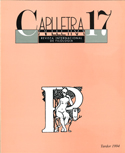La lexicografia bilingüe
DOI:
https://doi.org/10.7203/caplletra.17.7407Palabras clave:
lexicografia, biblingüisme Resumen
Resumen
A monolingual dictionary offers word definitions. A bilingual dictionary provides equivalences between a source language and a target one. It relates the words in the source language to some sort of definition by synonymy, with a different phonetics.
Can there be wholly satisfactory equivalences between the linguistic units in one language and those in another one? Does this question relate in any sense to the notion of linguistic universal? With respect to denotation, anything that can be expressed in one language can undoubtedly be said in another. The original cultural homogeneity between many languages (for example, the Indoeuropean ones) makes easy for them to syntonize with one another with respect to the universals.
The criteria that are used to choose and provide a hierarchy of lemmas with their different meanings in a monolingual dictionary can be easily applied to bilingual dictionaries. The number of entries usually depends on the greater lexical offer of the source language because of the interest that can raise in the transfer to the target language. However, should any «speech» fact be reflected in a bilingual dictionary?
Users can expect a good bilingual dictionary to offer a large amount of vocabulary, which is usual and genuine in a variety of registers, with a detailed semantic description of every word and a collection of the idiomatisms in which the word is involved. It is also expected that the dictionary user can understand and expression in a particular language and express it in another one without altering their meaning content.
 Descargas
Descargas
Descargas
Cómo citar
-
Resumen449
-
PDF (Català)172
Número
Sección
Licencia
El autor o autora que dirija un trabajo a la redacción de Caplletra para ser publicado tiene que ser la persona titular legítima de los derechos de explotación. La legitimación para la publicación del trabajo tiene que incluir también las imágenes, las tablas, los gráficos y otros materiales que puedan complementar el texto, con independencia de si es su autor o autora.
Copyright. Al publicar el trabajo en la revista, el autor o autora cede a Caplletra. Revista Internacional de Filologia los derechos de explotación (reproducción, distribución y comunicación pública), tanto para la edición impresa en papel como para la versión electrónica.
Todos los trabajos publicados en Caplletra se encuentran bajo una licencia Creative Commons del tipo Reconocimiento-NoComercial-SinObraDerivada 4.0.
RESPONSABILIDAD
Caplletra. Revista Internacional de Filologia no se identifica necesariamente con los puntos de vista sostenidos en los trabajos que publica.Caplletra. Revista Internacional de Filologia declina toda responsabilidad derivada de cualquier vulneración eventual de los derechos de propiedad intelectual que pudiera ser llevada a cabo por los autores o autoras.






